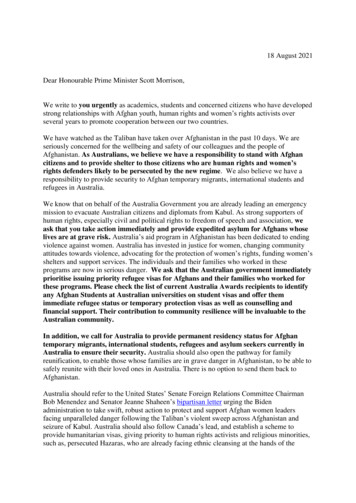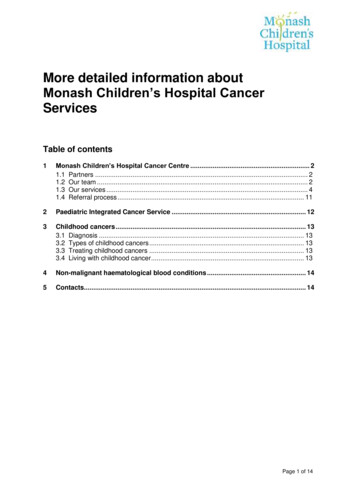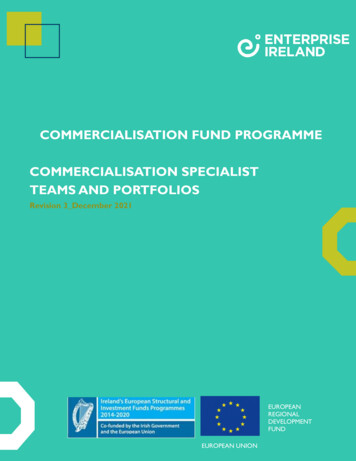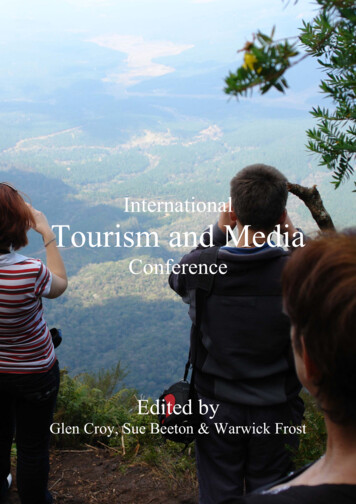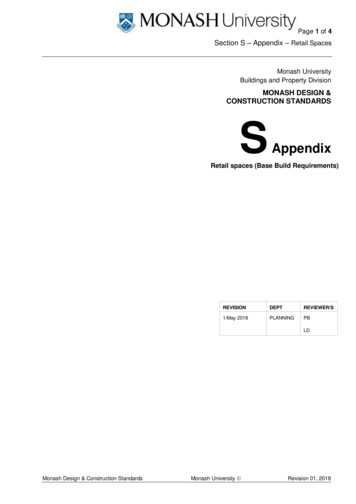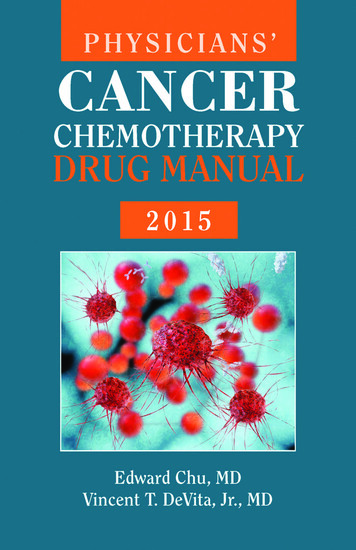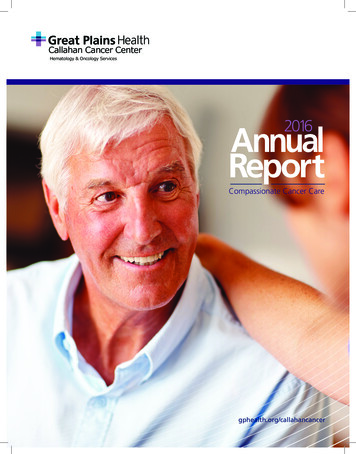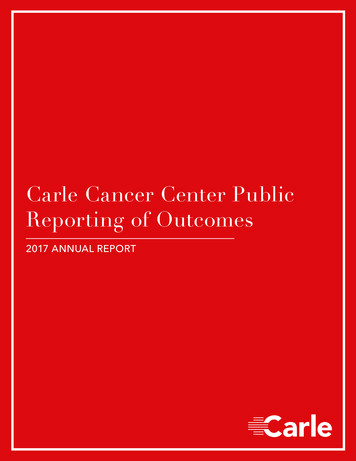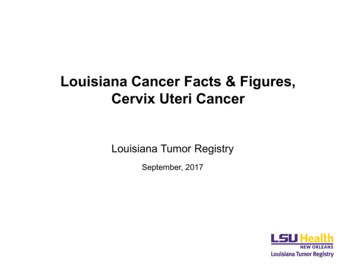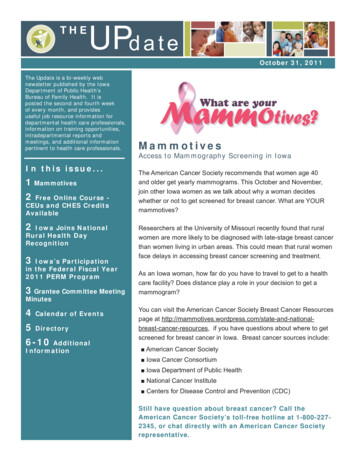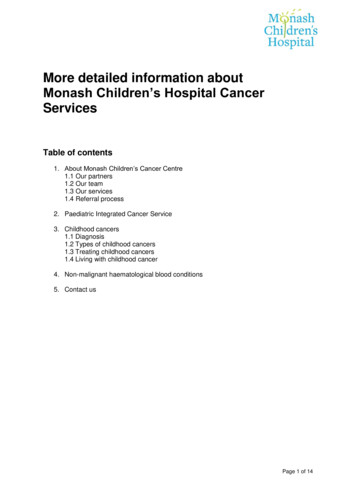
Transcription
More detailed information aboutMonash Children’s Hospital CancerServicesTable of contents1. About Monash Children’s Cancer Centre1.1 Our partners1.2 Our team1.3 Our services1.4 Referral process2. Paediatric Integrated Cancer Service3. Childhood cancers1.1 Diagnosis1.2 Types of childhood cancers1.3 Treating childhood cancers1.4 Living with childhood cancer4. Non-malignant haematological blood conditions5. Contact usPage 1 of 14
1 About Monash Children’s Cancer CentreMonash Children's oncology and haematology service is delivered in the Monash Children’sCancer Centre (Monash CCC). Here we provide preeminent care and treatment for infants,children and adolescents with cancer and haematological conditions.The Monash Children’s oncology and haematology service is based in the new MonashChildren’s Hospital at Monash Medical Centre Clayton and part of Victoria's largest healthservice, Monash Health.State of the art facilities at our new hospital include 9 dedicated cancer inpatient beds and acomprehensive, multidisciplinary outpatient service with 12 day treatment beds. In addition,a large Ronald McDonald Family Room with amenities, the Starlight room and cinema are allclose by and help to make life just that little bit easier for families caring for a sick child.Our Day Oncology Unit provides comprehensive ambulatory care. Here patients and theirfamilies will have their medical oncology or haematology consultations, see variousmembers of the allied health and psychosocial team and receive their day treatment. TheUnit has facilities suitable for general anaesthetic provision to allow minor procedures to beperformed in a familiar environment. A large playroom, outdoor play area and adolescentspaces help to provide distraction and entertainment during appointments and treatment. Awide range of treatment can be provided in the Day Oncology Unit. Children requiringinpatient care are managed within a paediatric ward right next door to the Day Oncology Unitwithin Monash Children’s Hospital.1.1Our partnersMonash Children’s Cancer Center is a formal partner of the Paediatric Integrated CancerService (PICS). The PICS works with the health services to improve patient experiences andoutcomes by connecting cancer care and driving best practice. For more information aboutthe PICS and to access information for families visit www.pics.org.au.Through the PICS, our Monash CCC has essential external partnerships with the RoyalChildren’s Hospital and Peter MacCallum Cancer Centre.The Monash Children’s Cancer Centre also has a strong focus on clinical and translationalresearch. We are members of the Children’s Oncology Group and participate ininternational clinical trials, as well as other clinical research. We also have a Children’sCancer research program focusing on brain tumours and solid tumours in children andadolescents. This is in the Hudson Institute of Medical Research through the Monash HealthTranslational Precinct, which is part of the Monash Health Clayton campus.1.2Our teamAt the Monash Children's Cancer Centre, an integrated multidisciplinary team of specialistmedical, nursing, psychosocial and allied health professionals provide care and services tomeet the clinical, physical, social and psychological needs of patients and parents. Thismultidisciplinary approach is directed towards maximising quality of life outcomes associatedwith cancer treatments and long-term survivorship. A range of sub-speciality paediatric andadministrative services supports the clinical service.Page 2 of 14
Consultant Medical Staff:Our senior medical staff has a wide range of expertise in all aspects of childhood andadolescent blood diseases and cancer. Dr Peter Downie MBBS FRACP – Director, and Head of Unit. Consultant Oncologistand Consultant Paediatric Haematologist.Dr Paul Wood BPharm MS MBBS FRACP PhD - Consultant OncologistDr Leanne Super MBBS FRACP - Consultant OncologistDr Katie Moore MBChB MRCP FRACP - Consultant OncologistDr Anisha Pillay MBBS FRACP - Consultant general paediatricianDr Kottayam Radhakrishnan MBBS FRACPath FRACP - Consultant haematologistand haematopathologistHaematology/Oncology Medical Fellows: Oncology Fellow – supported by the Bailey’s Day Clinical Fellowship Oncology Fellow in Research – Dr. Sara Khan, the Australian Lions ChildhoodCancer Research Foundation Fellow.Nursing Team: Nurse Unit Managers – Day Oncology Unito Natalie Radin Sharon De Graves Nurse Practitionerso Kate McLachlan – Paediatric Oncology Nurse Practitionero Katy Walshe – Paediatric Oncology Palliative and Supportive Care NursePractitioner Candidate Clinical Nurse Coordinatorso Karen Egano Sarah Huggins Nursing education teamo Clinical Nurse Educators – Chantelle Cabral and Carly Fletchero Clinical Support Nurses – Temora Senior and Jane Templeton Associate Nurse Unit Managerso Jennifer Granto Lauren Haddado Elizabeth Andrews Registered Nurseso Casey Alveyn: Clinical Nurse Specialisto Erin BentleyClinical Trials Team: Maree Williams Wilson LowPsychosocial Team: Social workerso Lynette Ozolso Stephanie Arrott-Watt Psychologist – Kate Holt Neuropsychologist – Sarah KnightAllied Health Team: Procedural Pain and Play TherapistsPage 3 of 14
o Karen Jollyo Emily YoungMusic Therapyo Priscilla PekDietitianso Natalie Koopmanso Caitlin Watsono Kristin MellettOncology Pharmacists: Tanya Selth Lisa Janson Brodie SmithSupport Services: Education advisors (teachers)o Heidi Gilmouro Kristy Taylor Family and Community Liaison Coordinator – Rebecca PahlAdministration Team: Lisa Richards Najia Zekaria1.3Our servicesA wide range of services within the Monash Children’s Cancer Centre support children,adolescents and their families through their treatment and care. These include:NURSING SUPPORTOur Children’s Cancer Centre (CCC) nursing team is a team of dedicated nurses who havechosen to specialise in the care of children with cancer and serious haematologicalconditions.NURSE UNIT MANAGERThere are two part-time Nurse Unit Managers in the Children’s Cancer Centre. The NurseUnit Manager has overall responsibility for the running of the unit. There is always a NurseUnit Manager on duty in the CCC should you wish to speak to her. Currently, our NUM’sare: Natalie Radin Sharon De GravesNURSE PRACTITIONERA Nurse Practitioner (NP) is a senior clinical nurse, with a Master’s of Nurse Practitionerqualification and advanced clinical knowledge and competence in their clinical specialty.Through a two year training process a NP develops extensive skills in the assessment,diagnosis, interpretation of results and knowledge of medications. Nurse Practitioners arerecognised as possessing expert clinical skills and can practice at a different level than othernurses. They must undergo a process of endorsement through the Nursing and MidwiferyBoard of Australia in order to be authorised to practice.Page 4 of 14
Within the Children’s Cancer Centre (CCC), there is both a fully endorsed and practicingNurse Practitioner and a Nurse Practitioner Candidate.What does this mean for the Children’s Cancer Centre?Nurse Practitioners work as part of the team in the CCC. They may see and assess yourchild during a normal clinic visit or when your child comes into the unit when they are unwell.The NP may prescribe the treatment, medication and specific tests that your child may need.In conjunction with the senior medical staff in the unit, the NP may recommend that yourchild is admitted to the ward for a period of observation.As part of their role, NP’s also teach other professionals, are actively involved in researchand provide clinical leadership within the CCC.The Nurse Practitioner teamKate Vandenberg is the Nurse Practitioner for Paediatric Oncology. She has fullendorsement and sees children at all stages of treatment for cancer.Katy Walshe is the Nurse Practitioner Candidate and is undergoing a process of scholarshipfor two years in order to be a fully qualified NP. She may see children at all stages oftreatment but will focus on supportive and palliative care.ASSOCIATE NURSE UNIT MANAGER’SAssociate Nurse Unit Managers are experienced nurses responsible for the day to dayrunning of clinical nursing care within the unit. They make sure that your child is seenpromptly and has the right treatment at the right time.They support nurses in the unit who are learning and have overall responsibility for theclinical care of your child.There is always an Associate Nurse Unit Manager on duty in the CCC, should you wish todiscuss any aspect of your child’s clinical care or management.The Team Ms Jennifer Grant Ms Liz Scanlon Ms Lauren Haddad Clinic nurses: Ms Casey Alveyn Ms Natalie WithamClinical Nurse CoordinatorsA Clinical Nurse Coordinator (CNC) helps manage all aspects of a child’s treatment both inhospital and at home. This means that you will see the CNC when your child is firstdiagnosed, whenever your child is in hospital as an in-patient on the ward, or when yourchild comes in to the CCC for day chemotherapy.The CNC books scans for your child whenever they are needed, helps organise blood tests,ensures that your child has the necessary referrals in place for other things like radiationtherapy, stem cell harvesting and nursing care in the community or palliative care.The CNC works closely with the medical, allied health staff and other nurses to ensure thatyour child receives a seamless service in the delivery of their cancer treatment.The Team Karen Egan Chatelle CabralPage 5 of 14
Clinical Support NursesOur Clinical Support Nurses (CSN) work both on the wards and within the CCC. Theyprimarily support nurses to safely deliver chemotherapy and other supportive care thatchildren with cancer require.Sometimes you will see the Clinical Support Nurses in the CCC helping your child.The CSN has a wide-range of responsibilities such as teaching and support in other areaswhere children with cancer might be cared for. You may see them in the Intensive care Unit,Emergency Department or Diagnostic Imaging.You may see the CSN teaching other nurses at Monash Health, both at the bedside orholding formal teaching sessions about children’s cancer care.The Team Temora Senior Erin BentleyClinical Nurse EducatorThe Children’s Cancer Centre has a nurse educator whose primary responsibility is toprovide more formal education and support for a variety of nurses who are working withinboth the CCC and as part of the ward nursing team.At Monash CCC, we run formal education days for nurses who wish to learn about paediatriccancer care. It is the responsibility of the Nurse Educator to organise and run theseeducation days.You may also see the Nurse Educator within the CCC supporting nurses who are learners inour environment or on the wards with the ward nursing team.The Nurse Education team are highly trained and have expertise in the care of children withcancer.The Team Jane TempletonNursing Rotation PositionMonash Medical Centre is a teaching hospital and as such we have learners in a variety ofareas including paediatric oncology. Nurses will rotate from the wards into the CCC for aperiod of 3 months before returning to the ward.CLINICAL RESEARCH TEAMThe Monash Children’s Cancer Centre is a member of the Australia & New Zealand ChildrenHaematology Oncology Group (ANZCHOG) and the International Children’s OncologyGroup (COG), which is the world’s largest organisation devoted exclusively to paediatriccancer research. These groups develop treatment protocols and clinical trials for childrendiagnosed with cancer. These protocols have been developed over years of extensiveclinical research and are considered the most up to date treatment schedules available. TheClinical Research Team (CRT) at Monash Children’s Cancer Centre support the Medicalstaff to ensure that the correct treatment and tests are performed.The CRT, nursing staff and medical staff aim to ensure that the rights, safety and well-beingof children and adolescents participating in clinical trials are protected.A summary of CRT work includes the following: Perform clinical research studies and clinical trials according to the internationalethical and scientific quality standard for designing, conducting, recording andreporting of clinical trials and research that involve the participation of humansubjects. Feasibility review and application of new national and international clinical researchstudies and clinical trials relevant to our patient population.Page 6 of 14
Collect, verify and report data collected for clinical research andtrial purposesShipping and storage of biological specimens for analysis and biobankingLiaise and working with human research ethics committee, external institutionalreview boards and research sponsorsThe Team Sema Cakan – Clinical Trials Manager Skye Nolan - Clinical Research Associate Kerrie Bull – Clinical Research AssociateResources Victoria Cancer Clinical Trials - https://www.cancervic.org.au/trials/ Australia & New Zealand Children Haematology / Oncology Group http://www.anzchog.org/ Children’s Oncology Group - https://childrensoncologygroup.org/PSYCHOSOCIAL SERVICESPsychology:A diagnosis of cancer can have a profound impact on paediatric patients and theirfamilies’ ability to psychologically process, manage and cope with the many changes totheir lives including dealing with painful or uncomfortable medical procedures, beingsocially isolated from family members and education, and adjusting back to “normal” lifefollowing treatment. Our psychology service is part of the broad multidisciplinary team,contributing an essential component of the treatment protocol within the MCCC toenhance patient (inpatient and outpatient) outcomes.A referral to the Clinical Psychologist for specialised mental health assessment andintervention for patients and families with complex psycho-emotional needs can bediscussed with senior medical staff, senior nursing staff and social workers of theMonash CCC team.The team:Dr Kate Holt PhD is a Senior Clinical and Health Psychologist with extensive experiencein working with children, adolescents and their families to promote their psychologicalwellbeing. Kate has worked at Monash Children’s Cancer Centre since 2010.NeuropsychologyChildren who are diagnosed with a brain tumour or whose medical treatment may affectbrain development will be referred to see a neuropsychologist. Neuropsychologyassessment looks at different aspects of thinking and behaviour. This helps tounderstand a child’s cognitive strengths and weaknesses and allows their developmentalprogress to be monitored, so that we can recommend suitable ways to best support themat school and at home.The neuropsychologist provides a service for children who are an inpatient, outpatient orwho attend the dedicated long term follow up clinic. Your doctor, nurse or other alliedhealth professionals can refer your child to the neuropsychologist.Page 7 of 14
The teamDr Sarah Knight, PhD is a senior clinical neuropsychologist and researcher. Sarah hasbeen with the Monash CCC since 2014.ResourcesA number of related written resources are available on the PICS website, see link:http://www.pics.org.au/WrittenResourcesSocial Work:Social workers are part of the multidisciplinary health care team, and are trained to provide arange of psychosocial services to enhance the quality of care for children and their familiesin both the inpatient and outpatient setting. Each newly diagnosed paediatric oncology orhaematology family will be assigned to one of the two social workers who work full time inthe Monash Children’s Cancer Centre. The social worker will meet with the patient andfamily regularly to assist with issues such as: Coping with diagnosis, illness and hospitalisationImpact of illness on patient and familiesParenting and care giving concernsCultural differencesNavigating and understanding the healthcare systemFinancial difficultiesAccess to community resources and supportsFamily issues and conflictsGrief, loss or end of life issuesThe social worker will ask parents to complete a Psychosocial Assessment Tool which asksquestions about your family, any support/s you have available and how your child and yourfamily are coping during this difficult time.The Team Lynette Ozols MSW Stephanie Arrott-Watt BSWALLIED HEALTH SERVICES:Procedural Pain and Play TherapyProcedural Pain and Play Therapists (also called Child Life Therapists) support childrenduring their hospital experiences. Play Therapists work with children of all ages, from infantsto adolescents.The procedural pain and play therapy team work closely with individual children and familiesto: Provide opportunities for age appropriate play and diversion activities Provide play and activities to facilitate emotional expression and ongoingdevelopment Encourage a sense of playfulness and fun in the hospital environment Familiarise children with medical procedures & equipment through medical play,discussion or written materialsPage 8 of 14
Facilitate coping with medical procedures using strategies such ascomfort positioning, deep breathing, distraction and individualised support plansOffer participation in The Beaded Journey program, where children collect colourfulbeads to represent their individual treatment pathThe Team Karen Jolly Emily Young Elizabeth nmanagementMusic Therapy:The Music Therapy service currently provides music therapy sessions to infants, childrenand adolescents who attend the Children’s Cancer Centre Clinics and who are inpatients onthe paediatric wards. Siblings, parents and family members are also encouraged toparticipate in sessions when appropriate.Music Therapy provides a unique avenue for expressing feelings and emotions through themedium of music. It can also address acute, chronic and procedural pain and may provideopportunities for relaxation and learning new strategies to cope with treatment andhospitalisation. The premise of music therapy is based on providing the patient withopportunities for choice and control in order to experience autonomy and empowerment inan environment where there are very limited opportunities for choice.Some of the music therapy techniques you may experience in a music therapy sessionsinclude: Singing familiar songsSong writingRecording your own songsMusic assisted counsellingComposition on computer based music software programsPlaying instruments and improvisationMusic relaxation and Guided ImageryListening to live or recorded musicMusic Library: borrowing instruments or recorded musicTherapeutic music lessonsThe Team Pricilla Pek Annette Baron Lucy ForrestResources:Australian Music Therapy Association Website www.austmta.orgNutrition & DieteticsPage 9 of 14
The nutrition team at Monash Children’s Hospital is dedicated to providing nutritionassessment, education and intervention for children who are being treated for cancer orblood disorders. Our dietitians are specialised and experienced in paediatric oncology andhaematology and provide advice based on the most up to date nutrition research.Children who attend the Children’s Cancer Service at Monash Children’s Hospital may needto see a dietitian for a number of reasons. These may include: Assessment and education following a new diagnosis Management of malnutrition, which may result from poor appetite, nausea orvomiting, diarrhoea or increased nutritional needs. These symptoms may be causedby the effects of cancer or side effects of the treatment (chemotherapy, radiotherapyor surgery) Management of tube feedingThe dietitians provide a service for children who are an inpatient, outpatient or who attendlong term follow up clinic. Your doctor, nurse or other allied health professionals can referyour child to the dietitian.The Team Natalie Koopmans, APD Caitlin Watson, APD Kristin Mellett, APDResourcesA number of nutrition related written resources are available on the PICS website, see NCOLOGY PHARMACYWe have a dedicated oncology pharmacy service based within the Monash CCC, and themain pharmacy is right next door. Our pharmacy staff are very experienced in paediatriconcology and haematology. They can give advice on drug side effects, management ofadministering oral medications at home, as well as helping to keep an accurate record inpartnership with parents, of dispensed and administered medications. We have a dedicatedoncology clinical trials pharmacist, and all our pharmacy staff are members of the Children’sOncology Group.The Team Lisa Jansen – Lead Pharmacist BPharm Tanya Selth – BPharm Brodie Smith BPharm, TNPSUPPORT SERVICES:Education advisorsFor children and young people who are diagnosed with cancer, school work might be the lastthing they want to worry about but maintaining a strong link between a seriously ill child andPage 10 of 14
their school community has positive impacts for a child, both while theyare undergoing treatment and once they return to school. These benefits cover all areas of achild’s wellbeing, including mental health, emotional wellbeing, social connectedness andacademic performance. This link is also vital for families and carers of the child, andparticularly for siblings, who may require additional support from their school communities.The teachers at Monash Children’s Cancer Centre will help support education by: Liaising with the schools to provide useful resources and maintain the link with theireducationProviding useful resources for both the school and familyLinking the child with additional support services (The Visiting Teacher Service &Ronald McDonald Learning Program)Offering advice on alternate educational pathwaysSupporting the student while completing workThe Team Heidi Gilmore – Teacher Kristy Taylor – TeacherResources ‘What about school’ – by Ronald McDonald Learning s/useful-resources.php When a Student Has Cancer – by The Cancer 580 Student cancer pages.pdf ‘Learning curve’: education and socialisation after childhood rimary FINAL.pdfFamily and Community LiaisonThe Family and Community Resource Liaison provides non-clinical support for patients andfamilies during their visit to the Monash Children’s Cancer Centre or stay in hospital. Theyfacilitate fun and engaging games and activities for patients and allow parents to have abreak without having to leave a child alone; they can play with siblings to allow the parents‘one on one’ time with the unwell child, or to have a private discussion with the medical staff.They also coordinate activities with philanthropic organisations that support programs suchas visiting art therapy sessions, book club and school holiday activities.The team Rebecca PahlReceptionThe Children’s Cancer Centre at Monash Children’s Hospital is dedicated to providing aplace that is friendly, safe and comfortable for children undergoing treatment and theirfamilies.When you enter the unit parents should let the receptionist know you are here before goingthrough to the waiting room. Patients coming for the first time will need a referral letter froma Consultant (valid for three months) or their General Practitioner (valid for 12 months) andon expiry of the letter you will be asked to bring a new letter. The clinic is bulk billed soplease make sure you bring your Medicare card. On leaving the unit please make sure youhave arranged for another appointment at the reception desk.Page 11 of 14
The Team Lisa Richards Najia Zekaria1.4Referral processAppointments to the Monash CCC can be made directly via telephone, email or fax(numbers and e-mail – we should set up a specific Monash CCC email referral address).You will need a referral letter from your doctor. Depending on the urgency of referral anappointment will be made for you to see one of our specialist doctors any time between 24hours and 2 weeks. Monash CCC is part of the larger teaching hospital of MonashUniversity. The director of the Monash CCC Dr. Downie is also a faculty member of theMonash University Department of Paediatrics. As such, there will be medical students andjunior doctors in training who will from time to time be part of the consultation process.2 Paediatric Integrated Cancer Service (PICS) and programsThe Paediatric Integrated Cancer Service (PICS) was established as part of the VictorianGovernment's cancer reform strategy. Partnering with Monash Children’s Cancer Centre atMonash Medical Centre Clayton, The Royal Children’s Hospital, Peter MacCallum CancerCentre and regional health services, the PICS aims to improve Victorian paediatric cancercare, working with the paediatric cancer community to establish coordinated services thatare consistent, evidence based and family-centred. The PICS support health professionals,develops information for families, and runs two statewide clinical programs, the RegionalOutreach and Shared Care Program (ROSCP) and the Long Term Follow-up Program(LTFP).Information for health professionalsThe PICS works in partnership with the health services to maximise opportunities foreducation and professional development for nursing, medical and allied health staff. Theinformation for health professionals included on the PICS website is designed to providepaediatric oncology clinicians with a user friendly and up to date portal containing paediatriconcology information and learning opportunities.Click here for further information Information for health professionalsInformation for familiesThe PICS has an ongoing commitment to developing information resources for families.These are developed in partnership with the health services and consumers. Over the yearsthe PICS has developed many resources including written information, videos and podcasts.Some of these resources have also been translated into other languages. As well as beingrelevant for families, these resources are also relevant for health professionals.Click here for further information Information for familiesRegional Outreach and Shared Care Program (ROSCP)The ROSCP is a program that facilitates the transition between the primary treating hospitaland the regional centre that cares for children and adolescents with cancer. The programprovides opportunities for shared care and ensures there are agreed levels of training andstandards of care of medical, nursing, allied health and supportive services.Page 12 of 14
Click here for further information Regional Outreach and Shared CareProgram (ROSCP)Long Term Follow-up Program (LTFP)The LTFP facilitates the transition from completion of curative treatment to the 'survivorship'phase of the cancer journey. The aim of the program is to provide a clear and consistentstandard of long term follow-up care across Victoria, which is responsive to the needs of allchildhood cancer survivors and their families.The program is accessible to all paediatric, adolescent and young adult survivors ofchildhood cancer living in Victoria. It provides each individual with a tailored approach tomeet their ongoing needs and an appropriate transition plan to adult-based, community orhospital services.LTFP clinics are held at The Royal Children’s Hospital, Monash Children's at MonashHealth, Peter MacCallum Cancer Centre, Alfred Health and at designated regional centres.Click here for further information Long Term Follow-up Program (LTFP)3 Childhood cancerHaving a child/teenager diagnosed with a serious illness such as cancer can impact theentire family and also extended family/friends/school. Families describe feelings like shock,disbelief, anger, fear and sadness. These feelings are all normal.It is often very overwhelming in the initial diagnosis phase. The Children’s Cancer Centreteam will help provide support, information and education to help you and your family at allstages of care and treatment. Sometimes the information provided can be hard to take in allat once. The team will help by providing important information in different formats. Thisincludes The Information Book – Life After Diagnosis. The Information Book is also availableon line: WEB.pdfThe following links provide helpful information about various aspects of childhood cancer.The Children’s Cancer Centre team is always happy to talk to you if you are unclear or havequestions about your child’s diagnosis, care and treatment.1.1 DiagnosisRefer to d-children/diagnosingchildrens-cancer1.2 Types of childhood cancersRefer to d-children/children-cancertypes1.3 Treating childhood cancersRefer to d-children/treating-childrenscancers1.4 Living with childhood cancerPage 13 of 14
Reactions and emotions to childhood cancer d-children/emotions-childhood-cancerLife during and after childhood cancer -and-children/life-childhood-cancer4 Non-malignant haematological paediatric blood conditionsMonash Children’s Cancer Centre provides care and treatment for children and teenagerswith a range of non-malignant haematological paediatric blood conditions. These caninclude: Newborn consultation service to the neonatal intensive care unit, and newbornnurseryConsultation and management of thrombosisAll other congenital blood diseases (including hereditary spherocytosis, BlackfanDiamond syndrome, Schwachman-Diamond syndrome, and congenitalneutropaenias)Monash Health is also the Victorian state-based thalassaemia service providing diagnosis,treatmen
medical, nursing, psychosocial and allied health professionals provide care and services to meet the clinical, physical, social and psychological needs of patients and parents. This multidisciplinary approach is directed towards maximising quality of life outcomes associated with cancer treatments and long-term survivorship.
